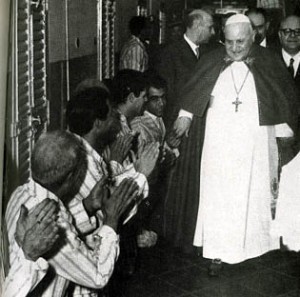This post is the second piece in a series about Pope John XXIII, who opened the Vatican II Council on October 11, 1962. I hope we can celebrate the 50th anniversary of the council, and live out its mission, by following the example of the Good Pope.
John’s motto for his papacy was “pastor and father.” He didn’t just preach about unconditional Christian love, but he lived it by intimately engaging with people, even when it was unpopular.
Like a loving grandfather, John encouraged parents to “give their children a kiss from the pope,” and every day would pray the rosary for all the babies born in the world that day.

He could easily empathize with others, and, while working as a military chaplain during World War I, wrote, “It often happened—permit me this personal memory—that I had to fall on my knees and cry like a child, alone in my room, unable to contain the emotion I felt at the simple and holy deaths of so many poor sons of our people.” As a diplomat in Europe during World War II, John worked secretly to save Jews by forging birth certificates and marriage papers.
John constantly practiced and encouraged aggiornamento—updating or renewal—during a time when the Church, for so long, had refused to engage with the modern world.
He not only pushed the Church toward aggiornamento by calling the Council, but he also sought to redefine his own position as pope. He took the name John upon ascending to the papacy, despite the fact that the name was considered “unsalvageable” after the militaristic John XXII had tainted the name. The Good Pope reclaimed the name and transformed it.

John broke with the papal tradition of seclusion and made the world his home. In a radical move, he celebrated his first Christmas as pope at a local prison. Upon meeting the prisoners he said, “You could not leave to see me so I came to you.”
Only days into his papacy—which many had assumed would be a short-term, transitional period, given John’s old age—John announced he plan to call a council. It came in a “flash of inspiration” from the Holy Spirit, he said, and took swift action to make it happen.
John addressed the fears of Church leaders and laity who were wary about a council, and about bringing the Church into the modern world that it, for so long, had pulled away from.
In his opening speech at the council, John said, “We must disagree with these prophets of gloom,” who could only see the destruction and corruption of modernity. “We must recognize here the hand of God,” John asserted, understanding the good that modernity could do for the Church, and the good that the Church could do for modernity. John quickly published an encyclical addressing all people (not just Catholics), which spoke about imperialism, just wage, social justice, human rights, relations with the Jews, liturgy, and religious freedom. Speaking in modern terms about modern crises, he wanted all the world’s people to know how much he loved them.
Yesterday, I wrote about John’s humor and humility. Tomorrow, I’ll discuss John’s attitude of detachment and trust.
Thank you for these postings, Jordan. It is indeed good to learn or re-learn the roots of Vatican II and the inspiration for it from Pope John XXIII. Sadly, most of us have take Vatican II for granted and that has left the playing field open to those who never embraced it and who, to this day, quietly work against it. I hope your posts inspire people to re-embrace Vatican II.